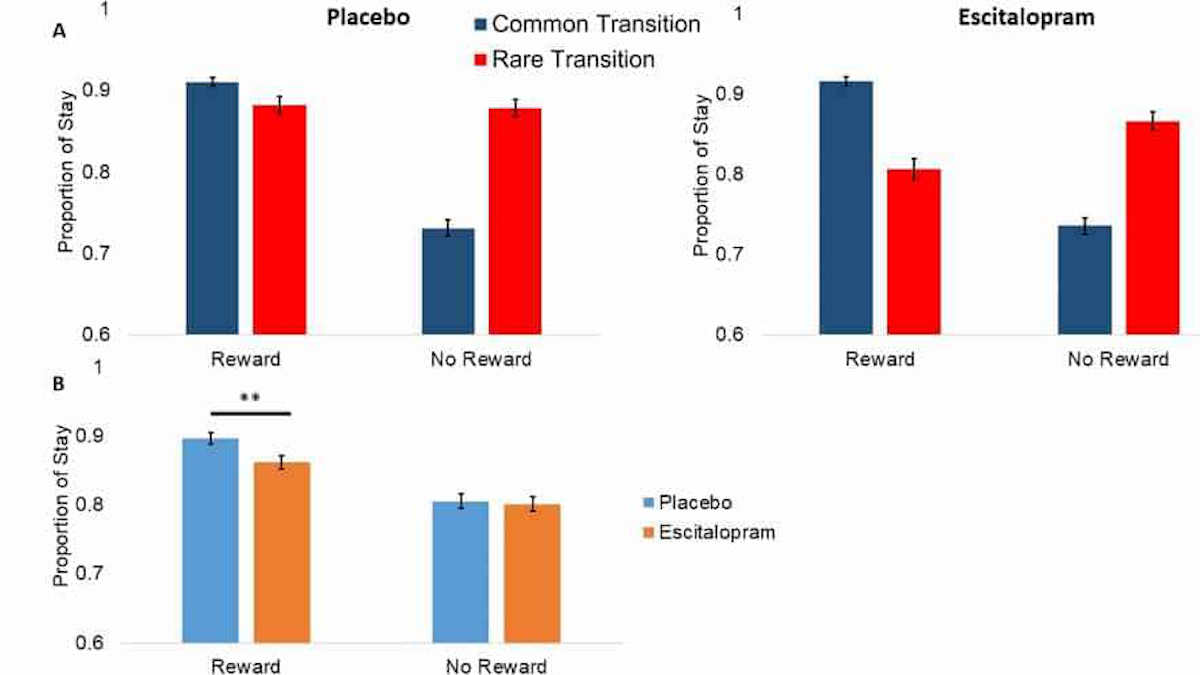Scientists have discovered why common antidepressants cause approximately half of their users to feel emotionally “blunted.” According to a new study, the drugs have an effect on reinforcement learning, an important behavioural process that allows people to learn from their surroundings.
Selective serotonin reuptake inhibitors (SSRIs) are a popular class of antidepressants, especially for chronic or severe depression. These medications target serotonin, a chemical that transports messages between nerve cells in the brain and is known as the pleasure chemical.
One of the most commonly reported SSRI side effects is “blunting,” in which patients report feeling emotionally dulled and not finding things as pleasurable as they used to. This side effect is thought to affect between 40% and 60% of SSRI patients.
Long Term SSRI Use
Most SSRI studies to date have only looked at their short-term use; however, for clinical use in depression, these drugs are taken chronically over a longer period of time.
A team led by researchers at the University of Cambridge, in collaboration with the University of Copenhagen, attempted to address this by recruiting healthy volunteers, administering escitalopram (brand name Lexapro), an SSRI known to be one of the best-tolerated, over several weeks, and assessing the drug’s impact on their performance on a battery of cognitive tests.
The study involved 66 volunteers in total, 32 of whom received escitalopram while the remaining 34 received a placebo. Volunteers completed a thorough set of self-report questionnaires, took the medication or a placebo for at least 21 days, and underwent a battery of tests to gauge their cognitive abilities, including learning, inhibition, executive function, reinforcement behavior, and decision-making.
When it came to “cold” cognition, such as attention and memory, the team did not discover any notable group differences. Most tests of “hot” cognition (cognitive processes involving emotions) also showed no differences.
Reduced Sensitivity In Reinforcement Learning
The main novel finding, however, was that the escitalopram group performed two tasks with less reinforcement sensitivity than the placebo group did. We learn from feedback from our actions and the environment by using reinforcement learning.
The researchers used a “probabilistic reversal test.” to assess reinforcement sensitivity. A participant in this task would typically be shown two stimuli, A and B. If they chose A, they would receive a reward four times out of five; if they chose B, they would only receive a reward one time out of five.
Volunteers would not be told this rule; instead, they would have to figure it out for themselves. At some point during the experiment, the probabilities would change, and participants would have to learn the new rule.
The team discovered that escitalopram-treated participants were less likely to use positive and negative feedback to guide their learning of the task than placebo-treated participants. This suggests that the drug altered their responsiveness to rewards and their sensitivity to rewards.
Pain And Enjoyment
The finding may also explain the one difference observed in the self-reported questionnaires, namely that volunteers taking escitalopram had more difficulty achieving orgasm during sexual activity, a commonly reported adverse effect among patients.
“Emotional blunting is a common side effect of SSRI antidepressants. In a way, this may be in part how they work; they take away some of the emotional pain that people who experience depression feel, but, unfortunately, it seems that they also take away some of the enjoyment. From our study, we can now see that this is because they become less sensitive to rewards, which provide important feedback,”
said senior author Professor Barbara Sahakian, from the Department of Psychiatry at the University of Cambridge.
The findings lend support to the role of serotonin in reinforcement learning. The researchers are following up on this work with a study that will look at neuroimaging data to see how escitalopram affects the brain during reward learning.
Reference:
- Langley, C., Armand, S., Luo, Q. et al. Chronic escitalopram in healthy volunteers has specific effects on reinforcement sensitivity: a double-blind, placebo-controlled semi-randomised study. Neuropsychopharmacol. (2023) DOI: 10.1038/s41386-022-01523-x
